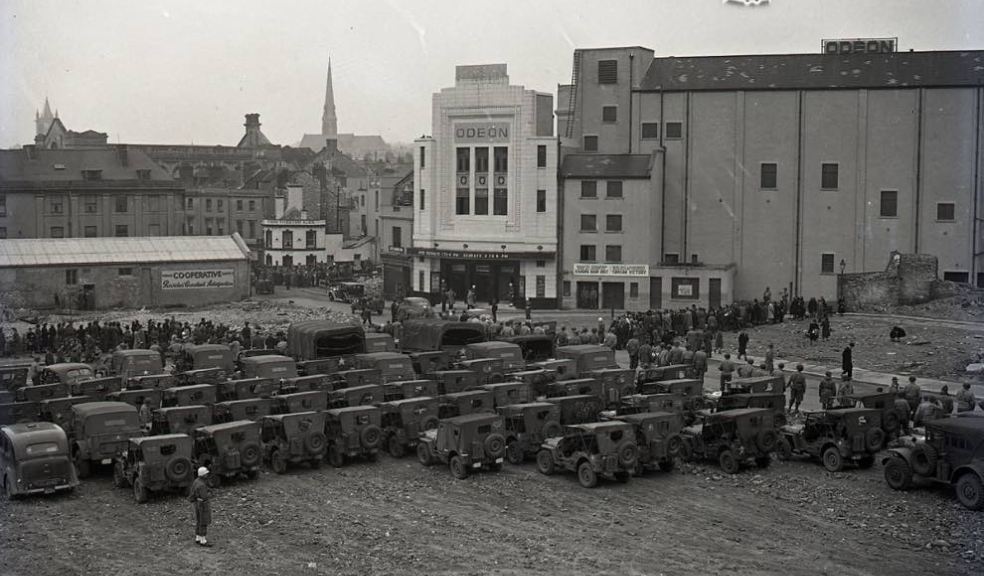
Plymouth Salutes D-Day Heroes 80 Years On
Britain's Ocean City was at the forefront of the Allied assault on the Normandy beaches that marked the beginning of the end of WWII
Britain's Ocean City was at the forefront of the Allied assault on the Normandy beaches that marked the start of the liberation of France, and the city is this year preparing to honour the memory of thousands of British and Allied Servicemen based in Plymouth as part of the 80thanniversary of the D-Day landings.
An echo of the role of the city in WWII was discovered in February this year when a 500kg unexploded bomb was recovered in the back garden of a residential property and successfully and efficiently removed by Armed Forces’ bomb disposal specialists.
Plymouth’s very own former WREN Suzanne Sparrow remains one of the last witnesses to the city’s role in the greatest amphibious landing the world has ever seen - and is among those preparing to honour all the heroes of Operation Neptune 80 years on - a Royal Navy coxswain but, astonishingly, still a teenager when she played her part in the prelude to D-Day.
Suzanne was just 17 when she joined the WRENS in 1942 and still only 19 when the invasion force set sail two years later on June 6, 1944. Codenamed Operation Neptune, the Normandy landings made up the largest seaborne invasion in history and played a crucial role in liberating Western Europe from Nazi occupation.
She was one of the first women to become a small boats coxswain and trained at the city's naval base HMS Drake, going on to work at the dockyard's landing craft base atSaltash Passage beneath Plymouth's Tamar Bridge where, in the run-up to D-Day she witnessed the massing of vessels and thousands of troops.
The operation was top secret but Suzanne, now almost 100, was privy to the movements of the American forces, estimated at 36,000, as they loaded up their landing craft in the days before they departed for Omaha and Utah beaches. '’I was told not to speak about what I had seen...it really was the most astounding operation that could ever have happened. People had no idea of the scale of what was going on.
'’There was an air of excitement almost because nobody quite knew what was brewing. You had to realise how tense the atmosphere was for them when they finally realised what had happened.'’
Now 80 years after that momentous day, Suzanne and the people of Plymouth will remember all those heroes who played such a crucial part in signalling the beginning of the end of the conflict. Those included thousands of US personnel, many of them stationed at Mount Edgcumbe House & Country Park and who left from Barn Pool Beach bound for Omaha Beach in Normandy.
Highlighting the historical uniqueness of Plymouth’s role, local historian and author, Chris Robinson, says: “Plymouth was the logistics hub for operations across the whole of the Westcountry. It was the only town or city in Britain to have bases for the Army, Royal Navy, Royal Marines and Royal Air Force and tens of thousands of troops were based here and even more left from here.”
The city is staging a series of events to commemorate the anniversary which started on Monday, May 20 with an 11am ceremony at Plymouth Naval Memorial featuring the Commonwealth War Graves Commission's Torch of Commemoration.
On Thursday, June 6, there will be a D-Day Memorial Service organised by the Federation of Ex-Services at Saltash Passage and that night a beacon will be lit at the Royal Citadel at Plymouth Hoe at 9.15pm. At the same time, at Saltash Waterside, locals are invited to commemorate D-Day by remembering all those who took part or were affected by the events of eight decades ago and shining a light in a display of peace.
There will also be D-Day displays in local libraries from June 6 to 15 and, following June 6, final year Crafts and Material Practices student Stuart Morrissey from Arts University Plymouth will hand over a memorial sculpture and bench, dedicated to the men of US 29th Infantry Division who trained in the area, to Mount Edgcumbe House & Country Park - where service troops were stationed and prepared for the historical moment in 1944 – where this will find a permanent home.
And on Saturday, June 29 and in association with Plymouth-based Babcock International, this year’s Plymouth Armed Forces Day - set to take place on The Hoe, the site of Plymouth’s iconic Smeaton’s Tower Lighthouse - promises to be bigger and better than ever, with an exciting family day packed with displays, parades, military equipment to explore, a thrilling arena programme, live music and much more. This edition will include the Armed Forces Day Veterans Village - supported by the Royal British Legion, whose representatives will be at hand to answer questions and highlight how they support serving personnel, veterans, and their families. Over 80 charities and organisations will be on-site, offering information and an array of hands-on activities to enjoy and individual Military Villages to be visited.
For more information on Plymouth events to salute D-Day please visit the official website page.













